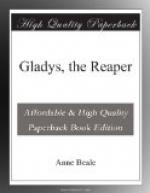When they arrived at home they found the party from Abertewey ready to receive them,—at least, Mrs Gwynne Vaughan and her children. The colonel was to join them at dinner.
‘Oh, Freda, dear, I am tho glad you are come home again!’ lisped Mrs Gwynne Vaughan. ’Tho ith Gwynne. He thaith it will be delightful to have you. Thith ith little Gwynne, and thith ith Minnie, and we call thith one Dot, and baby ith in the nurthery. You thall thee her by-and-by. Kith Aunt Freda, Minnie,—they all call you Aunt Freda, you know.’
Freda, not at all rejoicing in the honour, stooped to kiss all the pretty little children by turns, and had soon made friends with them all. The children were the greatest possible relief to her; she turned to them as a sort of neutral ground between the war in her own heart and the tact and inanity of her stepmother and stepsister.
The latter was as unchanged as the former. Very handsome, very fashionably dressed, very good-tempered,—in short, Miss Nugent simply turned into Mrs Vaughan. Freda wondered how the really clever and agreeable Colonel Vaughan could live with so dull a companion.
Having got through luncheon and the afternoon somehow, thanks to the children, the dinner-hour arrived, and therewith the colonel. Freda always felt reserved with him, and his studied kindness and politeness to her when she had met him occasionally in London, irritated her. She had spoken to him before his marriage so unreservedly of his wife, and had given him to understand so unmistakably that she knew what had passed between him and Gladys, that she fancied he must at heart cordially dislike her. Moreover, she had loved him. Much as she despised herself now for having done so, she knew it, and she despised him all the more on that account.
There was, however, no mistaking the real warmth of his welcome, and for the moment—only for the moment—Freda’s heart beat quick.
’I am so glad to see you, Freda,—sister Freda, you know, now,—and looking so well.’
’Yeth, ith’nt the looking well. I think the lookth younger than when the went away.’
‘Handsomer, at any rate. I may pay you a compliment, now, Freda.’
Freda could not return it. Colonel Vaughan looked more than six years older since his marriage, and there was a dissatisfied expression on his countenance very different from the old suavity.
Freda was not long in discovering that if he had improved his fortune by marriage he had not improved his temper, or increased his happiness. Fortunately for his wife, her imperturbable placidity and want of acute feeling prevented her from appropriating many hard hits from her husband that would have made Freda wretched.
Again, she admired the tact of the mother. By it she managed her husband admirably, and retained her power over him in precisely the same way as she did before she married him; while Wilhelmina wholly lost what little she had gained over hers prior to her marriage. Her silliness annoyed him continually, and her beauty, for want of expression, palled upon his fastidious taste.




